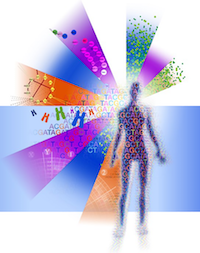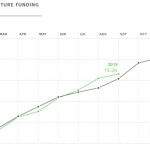Movement toward personalised medicine gains momentum
In 2010, at a TEDMED event, Thomas Goetz said that “in healthcare, decision-making isn’t a science problem, it’s an information problem!”
For decades now, in fact centuries, medicine has been generating data on diseases, patients and treatments through the myriad of academic and R&D centres, the healthcare industry, hospitals and, of course, our local doctor. The volume and velocity of this medical data creation has increased significantly in the past few years (we address this topic in greater detail in our iDisrupted book).
Unfortunately, each one of these data sets is siloed from the other, but each one represents a piece of the puzzle facing medical researchers attempting to cure diseases such as cancer.
To date, most of the learning of disease treatment is in clinical trials, which invariably are set up to prove a particular outcome. However more than 90% of patients do not participate in clinical trials, which is a significant hand brake on identifying medical solutions. “It’s a huge problem: If 100 patients walk in the door, we’re only learning from four of them” said Turner, the co-founder of Flatiron Health.
Information is certainly collected on the more than 90% but it is typically trapped in electronic medical records systems and doctors’ notes.
If we were able to aggregate the data from all the patients and organize it so that it becomes usable by doctors, clinicians, patients, and any of the stakeholders, we would ultimately be able to massively improve cancer care amongst many chronic diseases. The solution is to build a neural network, just like the human brain, by interconnecting all the relevant data sources with the super computing power required for the analysis and make it available to the medical researchers.
With this in mind, Intel has announced that it is creating the Collaborative Cancer Cloud, with the goal to make cancer treatment plans possible in just one day by 2020. Intel is going to open-source components of the cloud platform in 2016. The Collaborative Cancer Cloud is a precision medicine analytics platform that allows institutions to securely share patient genomic, imaging, and clinical data for potentially lifesaving discoveries. It will enable large amounts of data from sites all around the world to be analysed in a distributed way, while preserving the privacy and security of that patient data at each site.
When announcing the Collaborative Cancer Cloud, Intel wrote, “Each year millions of people all over the world, including more than 1 million patients in the United States, learn that they have a cancer diagnosis. Instead of going through painful chemotherapy that can kill healthy cells along with cancerous cells, what would happen if those patients were able to be treated as individuals based on their specific genome sequencing, and a precision treatment plan could be tailored specifically for their disease? And what if it could happen within 24 hours?”
Similarly, IBM has announced deals with Apple, Johnson & Johnson, and Medtronic with a view to transforming healthcare through the creation of a new computational model that will link together all of the massive computers that now hold medical information.
We have also seen partnerships form between the pharmaceutical industry and patient-centric websites such as PatientsLikeMe. For example, the global pharmaceutical company, AstraZeneca will focus initially on using patient-reported data from PatientsLikeMe to guide R&D in respiratory disease, lupus, diabetes and oncology, before expanding out into other therapeutic areas. The main objective is to better understand what patients are going through and what they value in a treatment. Including such data into R&D programs should cut the risk of developing a drug that is clinically effective but fails to fit in with the lives of patients.
In the UK, the NHS is attempting a similar outcome with the Care.Data initiative to take data from doctor records and upload them to the national Health and Social Care Information Centre (HSCIC) databases to find more effective ways of preventing or managing illness; monitor the risk of disease spread, and streamline inefficiencies.
Access to data is therefore good for medical science, but potentially risky for the individual. By aggregating and analysing vast quantities of digital information from multiple sources, including the emerging class of wearable devices and smartphone apps, medical professionals will be well equipped to solve major health problems.
So, society is faced with this healthcare big data debate: public good vs. privacy. We would encourage a responsible and informed debate involving all stakeholders so as to ensure that we all benefit from these medical advances. After all, we all know at least one person who has been affected by cancer.
Author: Julien de Salaberry @ The Propell Group
Originally published @ iDisruped

